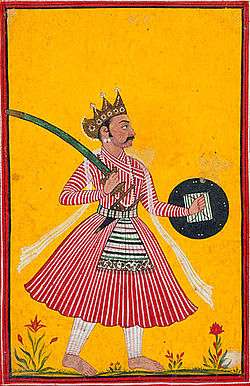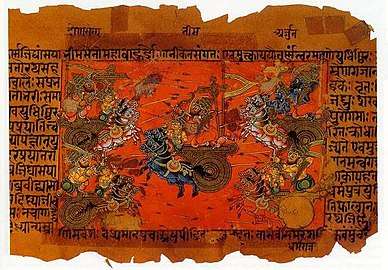Nakula
In the Hindu epic Mahabharata, Nakula was fourth of the five Pandava brothers. Nakula and Sahadeva were twins born to Madri, who had invoked the Ashwini Kumaras. Nakula and his brother Sahadeva, are both called as Ashvineya(आश्विनेय), as they were born from Ashvinas.[2]
| Nakula | |
|---|---|
 Nakula | |
| In-universe information | |
| Affiliation | Pandava; Character of Mahabharata |
| Weapon | Sword |
| Family | Sahadeva Yudhishthira, Bhima, Arjuna and Karna (Brothers) |
| Spouse | Draupadi, Karenumati [1] |
| Children | Shrutsena, Niramitra (son from Karenumati) |
Exile

Yudhishthira's loss in the game of dice meant that all Pandavas had to live in exile for 13 years. Once in exile, Jatasura, disguised as a Brahmin, kidnapped Nakula along with Draupadi, Sahadeva and Yudhishthira. Bhima rescued them eventually and in the fight that ensued, Nakula killed Kshemankara, Mahamaha, and Suratha.[3] In the 13th year, Nakula disguised himself as an ostler and assumed the name of Damagranti (between themselves, the Pandavas called him Jayasena) at the Kingdom of Matsya. He worked as a horse-trainer who looked after horses in the royal stable.[4]
Role in the Kurukshetra War

Nakula desired Drupada to be the general of the Pandava army, but Yudhishthira and Arjuna opted for Dhristadyumna.[5]
As a warrior, Nakula slew prominent war-heroes on the enemy side. The flag of Nakula's chariot bore the image of a red deer with golden back.[6] Nakula was the leader of one of the seven Akshahuni.
On the 1st day of the war, Nakula defeated Dussasana, sparing his life so that Bhima could fulfill his oath.
On the 11th day, Nakula defeated Shalya, destroying his mother Madri’s brother's chariot.
On the 13th day, his advance into Drona's formation was repulsed by Jayadratha.
On the 14th day, he defeated Shakuni.
On the 15th day, he was defeated by Duryodhana, being rescued by Chekitana.
On the 16th day, he was defeated and spared by Karna[7]
On the 17th day he killed Shakuni's son Vrikaasur and fulfil his oath of killing Vrikaasur taken on day of deciding rules of war.
On the 18th day of the war he killed three sons of Karna, Sushena, Chitrasena and Satyasena.
After the War
After Shalya, Yudhishthira appointed Nakula as the King of Northern Madra kingdom and Sahadeva as king of southern Madra.[8]
Death
Upon the onset of Kali Yuga and the departure of Krishna, the Pandavas retired. Giving up all their belongings and ties, Pandavas, accompanied by a dog, made their final journey of pilgrimage to the Himalayas.
Except Yudhishthira, all of the Pandavas grew weak and died before reaching heaven. Nakula was third one to fall after Draupadi and Sahadeva. When Bhima asks Yudhishthira why Nakula fell, the reason given is his pride on his beauty and his belief that there was nobody that equalled him in looks.[9]
Special Skills
- Horse-keeping: Nakula's deep understanding of horse breeding and training is documented in the Mahabharata after the death of Narakasura by Krishna. In a conversation with Virata, Nakula claimed to know the art of treating all illnesses of horses. He was also a highly skilled charioteer.[10][11]
- Ayurveda: Being a son of the physicians, Ashwini Kumaras, Nakula was also believed to be an expert in Ayurveda.[12]
- Swordsman- Nakula was a brilliant swordsman and he showed his skills of sword while killing the sons of Karna on the 18th day of Kurukshetra war.
Citations
- https://web.archive.org/web/20100116130453/http://www.sacred-texts.com/hin/m01/m01096.htm
- Gopal, Madan (1990). K.S. Gautam (ed.). India through the ages. Publication Division, Ministry of Information and Broadcasting, Government of India. p. 73.
- Parmeshwaranand, Swami (2001). Encyclopaedic dictionary of Purāṇas (1st ed.). New Delhi: Sarup & Sons. p. 900. ISBN 9788176252263.
- Kapoor, Subodh, ed. (2002). The Indian encyclopaedia : biographical, historical, religious, administrative, ethnological, commercial and scientific (1st ed.). New Delhi: Cosmo Publications. p. 4462. ISBN 9788177552713.
- Menon, [translated by] Ramesh (2006). The Mahabharata : a modern rendering. New York: iUniverse, Inc. p. 88. ISBN 9780595401888.
- "Mahabharata Text".
- "The Mahabharata, Book 8: Karna Parva: Section 48". sacred-texts.com. Retrieved 27 January 2018.
- https://www.vyasaonline.com/encyclopedia/shalya/
- http://www.sacred-texts.com/hin/m17/m17002.htm
- "Mahabharata Text".
- Lochan, Kanjiv (2003). Medicines of early India : with appendix on a rare ancient text (Ed. 1st. ed.). Varanasi: Chaukhambha Sanskrit Bhawan. ISBN 9788186937662.
- Charak, K.S. (1999). Surya, the Sun god (1st ed.). Delhi: Uma Publications. ISBN 9788190100823.
